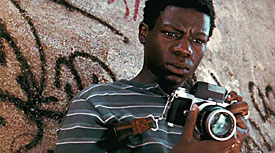 |
|
PHOTO COURTESY OF MIRAMAX FILMS
|
Alexandre Rodrigues stars as Rocket in "City of God." The film centers around violent youth gangs who ruled over slums in Rio de Janeiro for more than three decades.
|
|
By Nate Buchik
Arizona Daily Wildcat
Thursday March 13, 2003
Foreign films are usually very good. I think it's because the shitty foreign films don't make it all the way to the States.
"City of God" is a gripping and disturbing movie, and one of the best foreign films of the year ¸ note the Golden Globe nomination. Edgy cinematography and snazzy camera tricks give this true story of a Brazilian ghetto an excitement that helps it surpass other foreign films, which can be tedious to watch.
A cross between "Kids" and "Gangs of New York", "City of God" tells the story of Cidade de Deus, a city inhabited by homeless and poverty-stricken families that lacks any semblance of honest police. With interconnecting stories (like "Pulp Fiction"), we see the tales of people who live and die in the ghetto through the eyes and narration of Rocket (Alexandre Rodrigues), a kid who grows up during the three decades that the film encompasses, starting with the '60s.
Rocket dreams of being a photographer while a similar boy his age, Li'l Dice (Douglas Silva and Leandro Firmino da Hora), dreams of being the most powerful hood in the city. Li'l Dice kills before puberty while Rocket tries to stay out of trouble after suffering through the mistakes of his older brother.
In the '70s, Li'l Dice begins to live out his dream with a meteoric rise to power while Rocket struggles to remain innocent in the city that lives on crime. Li'l Dice eventually becomes the biggest drug dealer in the city by using kids and teens to build more power, and Rocket can't even get a decent camera.
The only other drug dealer in town, Carrot (Matheus Nachtergaele), sees his business threatened by the trigger-happy Dice, who changes his name to Li'l Ze. A war for the city breaks out as Rocket tries to steer clear of the battlefield.
The story grabs you immediately and never loses its intensity, especially as the city is destroyed by the war. You root for Rocket and hope he, unlike almost all others, can survive in the end.
The only recent film about Latin America I can think of is "Evita." Instead of the glitz and dance numbers of "Evita," Cidade de Deus shows a Brazilian life full of betrayal and revenge, casual murders and the people they affect.
The actors in the film ÷ primarily unknown Brazilian kids who were taught on the set ÷ convincingly commit horrific act after horrific act, giving the film an incredible realism. Let's just hope they're not scarred for life.
Wonderfully directed by Fernando Meirelles, City of God makes the audience consider how far removed we are from the violence that often exists outside American media's coverage range.
Foreign films traditionally meander along at a slower pace than Hollywood blockbusters and are often reserved for wine drinkers or people teetering around 60, but films like "Y Tu Mama Tambien", "Amores Perros" and "City of God" are part of a new, exciting movement that, hopefully, will motivate American youth to get a bit more cultured.
They don't drink any wine in "City of God" and there aren't any main characters over 25. Instead, we get to see coke-snorting and power-hungry kids who learn how to kill before learning how to tie their shoes.
And unlike "Gangs of New York" ¸ which tries hard to be an epic film ¸ "City of God"'s grandeur is understated, while its significance and epic qualities may be greater.

